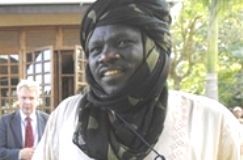Darfur rebel commander rejects Sudan’s pledge to ceasefire
September 14, 2007 (LONDON) — A leading rebel field commander of Sudan Liberation Army (SLA) rejected pledges by the Sudanese president to observe ceasefire at the start of the peace talks on 27 October in Tripoli Libya.

However the SLA commander for North Darfur region, Suleiman Marjan told Sudan Tribune that the pledge implies that al-Bashir will not adhere to the ceasefire agreement with those who refuse to participate in Tripoli talks.
Marjan also said that Al-Bashir’s pledge is an acknowledgement that he is not currently committed to the ceasefire agreement despite past statements saying otherwise.
The rebel commander urged the international community to step up pressure on Khartoum to abide by the 2004 ceasefire agreement after this public confession.
The Sudanese government and rebel groups signed a ceasefire agreement in 2004 in N’Djamena, Chad, which called for the establishment of the ceasefire commission and deployment of observers in the Darfur.
“Why does the international community wants us to entrust a partner that publicly acknowledges his incredibility?” Marjan said.
Marjan stressed that the Darfur conflict is a political one, adding that “we do not hold arms against Khartoum for government posts. We have our own demands as well others generated by the conflict such as the humanitarian situation and the IDPs requests.”
He invited the world to work out plans to realize lasting peace and ways to clear injustice in the western Darfur region, instead of putting pressures on rebel commanders.
“Continuing Injustice will breed more rebels. Threatening those who reject talks because they have their prerequisites will not end the conflict” he added.
He said that Khartoum must respect the ceasefire agreement they signed in 2004 and refrain from violence against civilians before any talks can commence saying this is the minimum requirement to prove its seriousness in achieving peace.
(ST)
